- Home
- Peter Grainger
Songbird Page 32
Songbird Read online
Page 32
Serena said to him, ‘So how is she, in herself? When does she start the treatment?’
And they want details, too. He didn’t have the answers but said he had no doubt a call from Serena over the weekend would be welcomed – she had Reeve’s mobile number, didn’t she?
The two of them, Serena and Ford, should have gone home but they were showing no signs of doing so. Waters’ focus was on Monday now. He asked Serena to put all the details of the afternoon’s developments concerning the car park into the central file for the Simms investigation – this would only take her a matter of minutes – and then he asked Ford for details of the dealer who had Fletcher’s car. Ford brought them over, with the news that he had already confirmed it was the same car. He’d left a message earlier, and while Waters had been out of the room talking to Wilson, the sales manager had called back, thinking he had a customer.
Waters said, ‘How did you leave it with the manager?’
‘I said we might need to speak to him about the car on Monday. I made sure it will still be there if we do, I said it might be of interest to us, sir.’
Ford was alright, steady and not inclined to flap or get over-excited; there was even a touch of the John Murrays about him. Soon the man himself would be back. Waters wondered what he would make of all this. It was another opinion that mattered.
‘Fine. How many of these calls to Pinehills still to go?’
Three was the answer. Waters told them he would make those now, and that the two of them should go while there was still some of Friday night left. He opened his own screen and saw the document he’d been working on – this should also be complete in a few minutes. With any luck, he would be home by eight o’clock himself. The thing he’d forgotten almost declared itself at that moment, but Serena came to his desk with sheets of paper, pointed out a couple of things and then stared at his screen.
He had headed the document simply “Michelle Simms”. Underneath that was a brief paragraph followed by a list of bullet points – quite a long list, summarising everything they knew about the woman beside whose body Waters had kept some sort of vigil that long, hot Friday morning. Two weeks ago, today… It felt more like two years.
Serena said, ‘Ha! Bullet points, one side of A4 or less! I haven’t seen one of those in a while. Is this for Freeman?’
He nodded, clicked save and then print, not looking at her directly because it wasn’t beyond Serena to make another and more accurate guess than that one. But she went away and tidied her desk. He knew that within the hour Serena would be talking to Alison Reeve, perhaps even arranging to meet for coffee or something, and that was a good thing. Ford was on his way as well. Waters told him he’d had a good week before he said goodnight. Alone in the office then, with three phone calls to make before he could go back to the flat…
… to the flat, where he’d promised to meet Janey more than two hours ago.
There was no text waiting on his mobile and no sign of a missed call. He dialled her number but it rang out and then went to leave a message. He didn’t because it would sound lame. They’d been here before. At first she had found it exciting, even a little romantic – my boyfriend’s a police detective, he has to go off on investigations at odd hours, he can’t always discuss his work – but that wears off after a while. Janey Cole was intelligent, and understanding up to a point; that point being the one at which she’d begun to suspect she might always be second on his list of priorities. To be a detective’s wife is to be a detective’s widow even when he’s alive and well.
Waters tried her number again with the same result. He was certain she could see who was calling and that she was refusing to answer. Then he put his mobile away, picked up the landline on his desk and found the list of potential witnesses from Pinehills.
When he arrived home, the flat was empty and silent. It was a few minutes after eight o’clock in the evening. Janey had tidied up before she got tired of waiting for him. He looked around for a note but there was no other sign she had been there. Ever. He went to the bathroom, opened the cabinet above the basin and saw that her toothbrush and things had gone. He didn’t know whether she had taken it today or on an earlier visit – when exactly didn’t matter. In the bedroom, he discovered that the drawers she had used for clothes had also been emptied.
He went through to the kitchen, turned on the grill and made a toasted cheese and chutney sandwich with the stale bread. Someone had once told him that stale bread makes the best toast. He couldn’t remember who but it was the kind of trivial-but-somehow-important life-skills advice Smith handed out on a daily basis. Tea leaves make a better cup than tea bags, every time. Yes, it might have been Smith.
Sitting at the small kitchen table with the sandwich, he poured the remains of a bottle of Madiran into a mug, too idle to fetch a wine glass from the cabinet. Red wine, that was another thing – he’d never bothered with it until Smith got involved. But it made the sandwich taste better, and that’s the whole point of a sandwich. He took out his mobile and laid it face up on the table besides the plate. He hadn’t been alone on a Friday night very often over the past year but this seemed like the way things were going to be for a while.
He was savouring the last mouthful of wine when the phone lit up and began to ring. It wasn’t her, just a number, but it had a vaguely familiar look about it. He accepted the call and said his name.
‘Funny coincidence,’ said a female voice, ‘that’s who I just called. What are you doing?’
It was Katherine Diver. Waters told her exactly what he was doing, going into quite a lot of detail about the sandwich and the wine. She said she’d always thought he was a man who knew how to drain the cup of life to its dregs, and then she asked what he was doing next, tonight, because there was a good saxophonist on at The Blue Note, starting in about an hour.
Waters declined politely and Katherine said it was OK, he could bring his girlfriend as well. He didn’t go into any details about that because it would just give Lake’s leading female private detective – and the only one, as far as he knew – just too many opportunities and he wasn’t in the mood.
Katherine said then, ‘Look, in case you’re getting the wrong idea, it’s nothing personal. If I wanted your body, I’d come to your flat in Old Wharf and take it. Resistance would be futile, you know that. I want to talk about something else.’
How did she know where he lived? They’d only met again a couple of weeks ago, after a gap of years, and he hadn’t mentioned that. Maybe another night, he said, he was at home but he still had some work to do for tomorrow. She couldn’t possibly know he wasn’t on duty over the weekend.
Katherine said, ‘Alright, this time. But I want to speak to you. It’s about a business opportunity.’
Yes, he would have asked at that point but she’d gone. A business opportunity? Seriously? She had talked about Diver and Diver that night in the club, and he could see and hear for himself they were doing well. But that well? Recruiting-police-detectives well?
He tried calling Janey again. Then he took the single sheet of A4 out of the briefcase he sometimes used for work, laid it on the kitchen table and studied it as if someone else had written it and he’d never seen it before.
Chapter Thirty
‘No, we don’t hear any traffic. Sometimes a dinghy goes by if the tide’s in…’
The three of them listened then, as if to see whether Smith was mistaken, but there was only the sound of a dog barking in the distance, somewhere far out on the marshes where the footpath wound its way east.
Jo said, ‘Don’t forget the jets, though.’
‘Ah,’ said Smith, ‘and the jets. When RAF Coningsby have saved up enough fuel coupons, they put on a bit of a show over the Wash. It’s their training area. If the wind’s in the west, they run in from here when they’re doing target practice. Typhoons, mostly. We reckon the estate agent kept it quiet but it’s a plus for me. A free air show once a month.’
Waters looked up into the sky as
if trying to picture a Typhoon fighter rolling and banking, going in low, but there was only a passenger plane at many thousands of feet, just a glint of sunlight leaving a vapour trail across the blue, heading north-east. He put down the coffee cup and picked up the binoculars that lay on the table. Now he could make out the great silver airliner but it was so high the sound wasn’t reaching where they sat in the rear garden of Drift’s End.
Smith said, ‘Too high for Scandinavia. We think they’re bound for the Far East or Russia. It’s a regular flight path, dozens every day.’
Waters nodded and replaced the binoculars. Smith had said “we” a lot since Waters had arrived for lunch an hour and a half ago, and that as much as anything else summed up the changes in his life since he’d retired. Common sense told you the two of them spent a lot of time together but it was evident in every conversation that they had lots of conversations – about the cottage, the village and its inhabitants, the ramblers and dog-walkers, the birds – there was a Drift’s End list with eighty-one species already – about the plants that would and would not grow in this soil, about what would happen if the tide got as high as it did in 1953. They’d be cut off, Smith said, possibly for days. Good thing he’d bought that dinghy. He seemed to be relishing the idea.
Lunch had been a chilled Chablis, salad and seafood, the latter all local from Wally Weston’s, two villages along the coast. When Waters inquired, he was told there really was such a man, it wasn’t a brand, and Smith had known him for donkeys’ years. Everything came off the few small boats that still managed to earn a living from the seas around the north Norfolk coast. As soon as Waters had arrived, Jo had said, ‘You do eat seafood, don’t you, Chris? We do, all the time. But I’ve got locally-made sausages I can do for you, and eggs and…’
Seafood would be good, he told her. Remember the crab salad you made me eat in The Queens Arms at Overy, he said to Smith – that was the first time he’d noticed seafood. He’d been trying to find something as good ever since. Smith had winked at Jo then and said they could match it because he’d been back there and got the secret formula for the dressing from Marjorie Harris, who owed him a favour or two. Yes, she was doing alright, and Julie Shapiro had recovered well from her leukaemia treatment…
Which, inevitably, brought about the moment when he told them about Alison Reeve. Smith had been silent for thirty seconds, and Jo had watched him as she asked Chris questions about the detective chief inspector whom she had met briefly on two or three occasions. From what she knew, she said, it’s one of those that if you catch it early enough-
‘You only found out about it yesterday?’
There was a familiar edge in the voice; the bad news had caught Smith off guard.
‘Yes, DC. As I already knew I’d be here today, I thought it better to tell you this way rather than on the phone. As far as I could tell, she’s OK, if that makes sense.’
Jo said that it did, and Smith asked whether Alison still had the same mobile number. There was no point in discussing whether he ought to ring her, and Waters guessed Alison Reeve would be expecting such a call anyway. The mood over lunch had become a little more sombre than it might have been, but what else can you do? Sitting there in the pleasant shade of Drift’s End on a Saturday lunchtime was one of those tiny, perfect moments but elsewhere, in the same instant, friends are confronting the other side of life, which is death – they are telling their own shattered parents the prognosis isn’t so bad and reassuring them that the consultant is one of the best in the field.
When they had finished eating, Waters declined a second glass of the Chablis because he was driving back, and Smith went to make coffee. Jo said, ‘He’s fond of Alison.’
‘Yes. They go back a long way.’
‘He’s fond of all of you, except someone called Wilson. And another one called O’Leary, I think.’
Waters smiled at the names, and she went on, ‘He thinks people don’t get in touch because they imagine he’s still at death’s door himself. As you can see, he isn’t.’
He didn’t know Jo well, but this was a reproach and she looked directly at him until he acknowledged it. He said, ‘I’ll have a word around the office. To be honest, when I turned up that Thursday, I was really surprised to find him so well. Last winter, when he was on the edge for so long… They seemed convinced he wouldn’t make it. Some people probably are nervous of seeing him again, just in case he isn’t… What he used to be, I suppose.’
It was enough of an explanation, if not an apology, for Jo to smile again. She said, ‘Well, I think he is but, as he’d probably say himself, only more so. As far as your visit on Thursday is concerned, I haven’t quite forgiven you. Did you wait until I was out of the house? Were you keeping us under observation?’
It was impossible to know whether she had remembered his car pulled into the driveway as she’d driven past that morning. No, he said, he hadn’t been, but there was no point in lying to her about the fact that he had come to speak to Smith about Oliver Salmon’s case – she’d already cornered him about it as soon as she had the chance, about ten minutes after he arrived today.
She said now, keeping an eye on the open stable door at the back of the cottage where Smith would shortly reappear with freshly-ground coffee, ‘He only has one more appointment with the surgeon, and then they’ll sign him off. As you can see, he seems to have made a full recovery. But I don’t want anything to risk that, Chris. If this didn’t involve Shirley and Oliver Salmon, I’d be telling you to back off.’
Jo Evison was a former detective inspector with the Met, and sometimes it showed. It must have been years ago because she was an established writer now – Waters had read two of her books about well-known murder cases – but as Smith himself used to say, you can leave the force but it never leaves you. This was invariably followed by bad Star Wars jokes, but it was true. Waters only had to think about his own father. If you talked with former detective sergeant Douglas Waters for more than five minutes, there would be some mention of his time in the Kings Lake police.
Waters said by way of defence, ‘I was in a no-win situation, Jo. I knew he hadn’t heard about Oliver because if he had, he’d have been in touch with me or Alison Reeve. And I also knew that when he did find out, he’d be annoyed with me for not telling him.’
‘I can see that. But you must also have known that when he did hear about it, he wasn’t just going to sit and do nothing. We had to drive over to Pinehills the same evening – there was no point in trying to stop him.’
Waters had never met Sheila Smith – she had died around about the time he was studying for his A Levels – and he wondered now how alike or how different the two women were. Sheila had been a teacher, well-read, Smith had told him, and well-respected. Waters remembered the many shelves of books in Smith’s previous home and wondered where they had all gone. And here was Jo, another woman involved with books and research and writing. They didn’t look much alike as far as he could tell from the photographs he’d seen of Sheila, who had been at least as tall as Smith, slender and dark-haired. Jo was shorter and blonde, ash blonde now after all the sun, the hair pulled back into a simple, short ponytail. Her dark blue-green eyes were upon him now, waiting for a response.
Waters said, ‘I do understand. I don’t have to say anything else about the case today. It was worth coming for the lunch.’
She wasn’t having any of that and laughed enough to encourage him.
‘But you were there that evening. What did you make of it? When Oliver went for a walk along the road to the dunes?’
Jo said, ‘I’d only met him once before, last year and very briefly, so I don’t claim to know him at all. But it was definitely peculiar, the way he stopped in the road. He was remembering something that had happened there. Someone with the right skill-set might get it out of him. It’s hard to imagine he did it, but…’
But the forensics – she didn’t need to say the words.
Smith appeared at the open door and said
two more minutes because he’d had to clean the grinder, he didn’t want this Costa Rican single estate contaminated with the Italian Roast they’d had at breakfast. When he’d gone back inside, Jo said, ‘So what did he tell you to bring today?’
She almost certainly knew the answer but she was keeping a distance from the two former colleagues, not wanting to presume – that was Waters’ guess. He was also sure there was no way she was going to go off and do the washing up while the two of them discussed the murder of Michelle Simms.
Waters said, ‘After I’d given him the outline, he said if it was his case he’d want to know as much as possible about the victim. I’d heard that before, obviously, but I asked why and he said it didn’t sound like a random one. He said she wouldn’t be one of those victims who were just in the wrong place at the wrong time…’
He let that tail away as he looked at Jo, searching for some sign that the two of them had already discussed this – they must have done so. But she kept her silence and gave nothing away.
Waters went on, ‘I don’t know how he got to that so quickly, from the little I’d said. I mean, I agree, but… It wasn’t just because he refuses to believe Oliver could have done it, was it?’
Smith was coming back with a tray of cups, saucers and cafetières. Why there were two of the latter Waters couldn’t imagine, until it was explained that the Costa Rican was strong stuff for young people, and rather than suffer in silence, they could have some of the more mellow Italian without embarrassment. Waters told him he was a very considerate host, and Jo agreed but she said he was also a nutcase about certain beverages and foods, to which Smith agreed but added that if one was naturally a connoisseur of the finer things in life, one should embrace one’s destiny because it, life, is short. And then he poured coffee for them. It was a moment in which nothing more needed to be said.

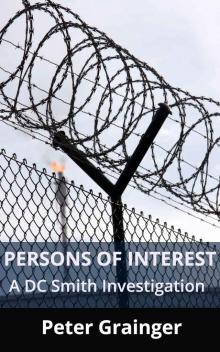 Persons of Interest
Persons of Interest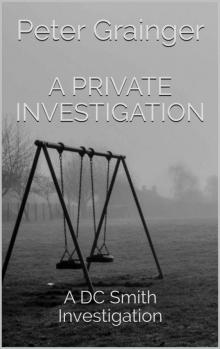 A Private Investigation
A Private Investigation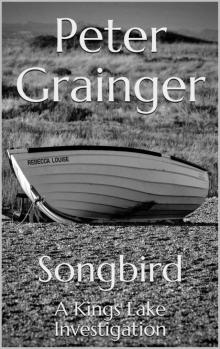 Songbird
Songbird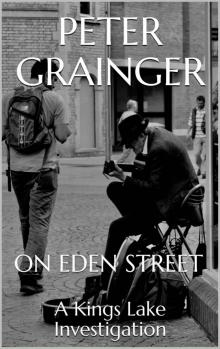 On Eden Street
On Eden Street An Accidental Death
An Accidental Death Time and Tide
Time and Tide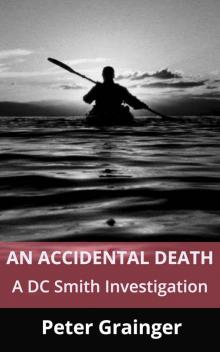 An Accidental Death: A DC Smith Investigation
An Accidental Death: A DC Smith Investigation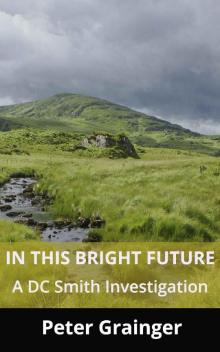 In This Bright Future
In This Bright Future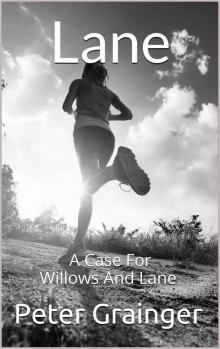 Lane: A Case For Willows And Lane
Lane: A Case For Willows And Lane The Rags of Time: A DC Smith Investigation
The Rags of Time: A DC Smith Investigation Luck and Judgement
Luck and Judgement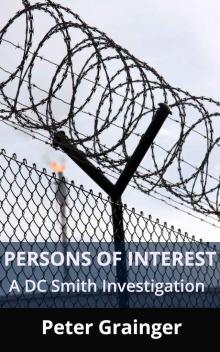 Persons of Interest: A DC Smith Investigation
Persons of Interest: A DC Smith Investigation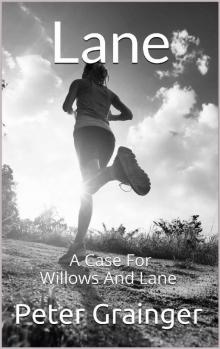 Lane
Lane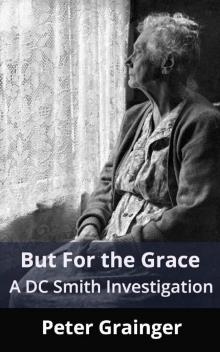 But For The Grace
But For The Grace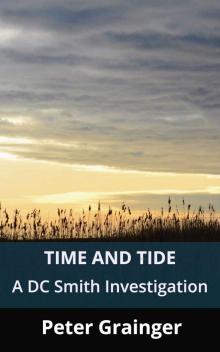 Time and Tide: A DC Smith Investigation
Time and Tide: A DC Smith Investigation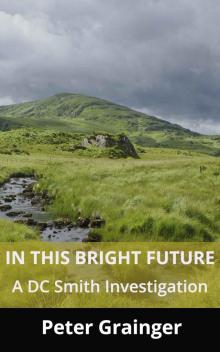 In This Bright Future: A DC Smith Investigation
In This Bright Future: A DC Smith Investigation The Rags of Time
The Rags of Time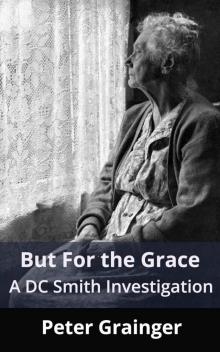 But For The Grace: A DC Smith Investigation
But For The Grace: A DC Smith Investigation Luck and Judgement: A DC Smith Investigation
Luck and Judgement: A DC Smith Investigation